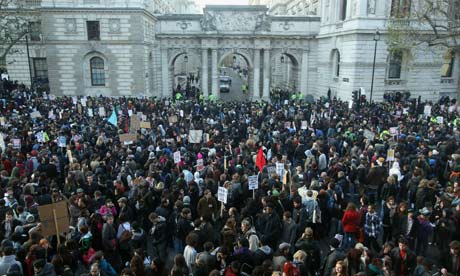There's a broad consensus that young people like me aren't interested in politics, which is flatly contradicted by recent protests. This week 130,000 students, sixth-formers and schoolchildren walked out of classes and lectures and took to the streets across the country. The government sought to portray those who took part in the recent protest at Millbank as a small faction of leftwing extremists and in turn undermine the entire day's protest. However, it's not so easy to write off thousands of schoolchildren worried about their future.
Young people are angry and this frustration is unquestionably political. However, it has no natural outlet in our politics. In the last general election, young people between the ages of 18 and 25 were more likely to become first-time abstainers than first-time voters. Only 37% of 18-24-year-olds voted in the 2005 general election. Most significant of all, 76% of young people didn't feel they could "influence government decisions".
It's not surprising that an overwhelming majority of us don't trust politicians. Many have chastised the Liberal Democrats for their U-turn on fees. But in the last few months, we have seen promises made and broken by all three major political parties. Nick Clegg's about-face is not an exception; it is par for the political course. With a national political debate like this, it's not surprising our disenchantment has become mistaken for apathy. It's not that young people are not interested in politics – politics isn't interested in us.
Recent research shows that the majority of young people have signed petitions or attended demonstrations in support of local campaigns to protect leisure facilities, prevent hospital closures or improve funding for further and higher education. However, they rarely recognised these actions as "political". What this shows is that for young people to become engaged with politics, it is politics that needs to change. But where to start?
First of all, lower the voting age to 16. At 16 you can join the army, get a job, pay taxes, get married, start a family. But you can't vote. Stopping 16- and 17-year-olds from voting sends a clear signal: "Your views aren't valid and you aren't real citizens." In order to make politics relevant we should be doing everything we can to encourage young people to engage.
Second, we need more imaginative and entertaining political education in schools and colleges – and I don't mean only introducing it as a pre-GCSE subject. Pupils should have an active role in decision making in schools through democratically elected representatives, as well as the opportunity to directly influence councils and local authorities through pupil-run campaigns. This would engender the importance of the democratic process and ensure that they understand they are stakeholders in both their education and their country. Whether it's a "core subject" or not, a concept of citizenship should be woven into the fabric of a pupils' education.
Third, politicians need to make more effort to consult young people and understand their concerns. Yes, this is a two-way street. If young people vote, politicians will listen. But any number of progressive politicians will heed the call of an energised youth vote. The average age for an MP in Britain is 50. If our political class reflects a wider cross-section of the population in terms of age, sex, ethnic origin and social class, then we will have made a start.
When it comes to youth issues, political will is shockingly sparse. Work on engaging young people in politics should be seen as an investment in the future of democracy – an investment in its legitimacy, relevance and engagement among the future adult population.
If no natural outlet is found in our politics for the frustration that is growing among the young, then politicians are at risk of disenfranchising an entire generation. They may never again have the opportunity persuade us that voting, democracy and the parliamentary process matter.

No hay comentarios:
Publicar un comentario